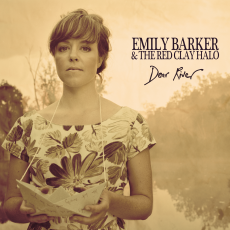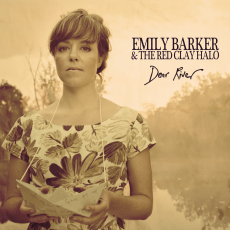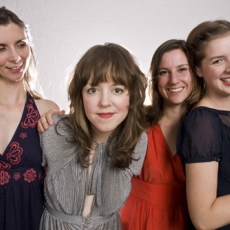Emily Barker & The Red Clay Halo - Dear River - The F Word
Dear River, the fourth album by Emily Barker & The Red Clay Halo (EB&TRCH) and their first for Linn Records, is that rarest of records: an instant classic. With not a gram of filler, it's the kind of album that immerses you from the first note to the last and leaves you wondering where the intervening 40 minutes went. Subtly knitted together by a combination of skilled musicianship, literate yet accessible songwriting and an exquisite quality of sound (due in no small part to the work of producer/engineer Calum Malcolm at Glasgow's Gorbals Sound studios), Dear River leaves other bands with lots more time and money at their disposal trailing in its wake. Yes, it's that good.
Emily, Anna, Jo and Gill have been previewing songs from Dear River on their seemingly endless touring schedule since last summer and, during their recent gigs in London, songs from it made up over half the setlist. Nevertheless, for anyone who's been fortunate enough to attend any of the recent live shows, hearing the studio recordings for the first time adds a whole other dimension to the experience.
Musically, there has been a noticeable yet natural progression from 2011's Almanac and the "chamber folk" style presented on that album now includes clear influences from other musical idioms: pop, rock and, perhaps most of all, Americana. Lyrically, the focus of Dear River is home, which might sound a fairly simple idea but which is actually a very nuanced subject. As Emily says:
Home is not only a place, but also is made up of the people we know and the stories we inherit from our family and ancestors.
Even this definition is only a starting point. I think home can be as much about a state of mind as a physical place - and, of course, leaving home and returning home implies journeying. The lyrics of title track and first single 'Dear River' illustrate this well, with Emily's story of her journey from her first home, the Blackwood River in Western Australia, to "a land we've never been". The catscratch of the muted harmonics leads into a loping backbeat which gains momentum as each of the instruments enters; the four-part vocal harmonies which are a hallmark of the band sit well in the mix and a spiralling bluegrass-infused violin break from Anna tops the whole thing off with panache.
'During this time they both attempted to get word back home to let their loved ones know they were still alive'
Leading with a with a nervy, skittering acoustic guitar, 'Tuesday' follows at a pace. Its stream-of-consciousness lyrics about refugees from armed conflict - the journey away from home into exile - are reflected in the urgency of the music. The fast shuffle of the drums which anchors the arrangement of Anna and Jo's strings (violin and cello, respectively) demonstrates EB&TRCH's ability to draw effortlessly on a range of influences and create an intensity of mood which transcends musical genres.
The idea of flight from conflict is further explored in 'Letters', this time from a more personal perspective. Emily drew her lyrical inspiration from the story of her Grandfather and his brother who fled Rotterdam during World War Two, leaving behind family and girlfriends (including Emily's Grandmother to be), hiding out for three years in woodlands, farmhouses and old factories along the German/Dutch border. Emily elaborates in the liner notes accompanying the lyrics:
During this time they both attempted to get word back home to let their loved ones know they were still alive. Imagine being a mother and not knowing if your sons were alive or dead. Imagine waiting, watching the clock for hours on end, for years on end, waiting for a sign, a message, a letter.
There is an introspective musical arrangement of 'Letters'; Gill's flute is prominent in the track before the slow power chords of guest guitarist Ted Barnes introduce the exquisite vocal harmonies. This creates a gripping power ballad, whose plaintive chorus evokes a sepia newsreel found in a dusty attic, its patinated images no less heartrending for the passage of time.
'The Leaving' is a fond recollection of childhood memories, with Ali Friend's bassline and Gill's electric piano flowing lazily throughout. Topped with the sweetest backing vocals you'll hear this year, this is a song where the Americana influence is perhaps most apparent and sounds all the better for it.
EB&TRCH have a collective outlook which could be described as post-modern in the sense that they embrace old and new, then and now, both in their methods of working and in their sound. One particularly distinctive feature of their approach to making music is the ability to be open to the past without letting it overwhelm the present. Even within their own oeuvre, Emily, Anna, Gill and Jo often revisit and rework earlier songs for the live stage, coming up with new arrangements of old favourites which are true to the originals while effortlessly creating quite radical reinterpretations - 'Everywhen' is a good example of this.
The theft of land and property - home - by so many European invaders is exposed for the violent materialism it enables
On record, it's a highly danceable rocker with Anna's plaintive violin weaving around the steadily pulsing bass as the vocals rail against the suppression, dispossession and genocide of the indigenous people of Emily's Australian home. On stage, it takes on other dimensions, where the motorik sensibilities of Kraftwerk are overlaid with the swirling swagger of Jo and Anna's classically-grounded strings. Either way, it's fascinating to witness the creation of a genuinely new sound which is surely destined to become a mainstay of drivetime radio shows everywhere.
By contrast, 'Sleeping Horses' drifts in on clouds of reverb with a bass like intermittent rumbles of distant thunder. A heavy-lidded meditation on full moon fever on a hot summer's night and a stargazer's hazy reverie in the stillness of the small hours, with Gill's slow-breathing accordion sparkling like the Milky Way, it's a beautifully restrained interlude; the eye of a hurricane formed by the preceding 'Everywhen' and the following 'Ghost Narrative'. The lyrics of this latter song arose following an epiphanic discussion between Emily and Josh Whiteland, whose Noongar people have inhabited the south-west corner of Western Australia for at least 45,000 years. Emily recalls her walk along the Blackwood River with him:
I asked him what "home" meant to him. He told me that for Indigenous Australians, the land and its people are interdependent. Every rock, tree, hill, valley, river and mountain range has behind it a story of creation and holds the spirits of their ancestors. [...] We acknowledged the brutal history of colonization and the existing distance between our cultures but, more importantly, we focused on sharing with one another: listening and learning with respect for our differences and at the same time, discovering our similarities.
'Ghost Narrative' relates Emily's wish that the two cultures will, in the near future, be able to "walk this land together" and the song's optimistic themes of healing, unity and peaceful coexistence manifest themselves in a midtempo pop/rock number . This sets Emily's bluesy harmonica against Ted Barnes' lead guitar to build an epic coda of which Neil Young would be proud.
The staccato banjo and guitar of 'A Spadeful of Ground' is neatly tied together by a smooth string arrangement and Nat Butler's restrained but inventive percussion. The uneven tempo of the track provides a compelling backdrop to a keenly observed retelling of the history of the 18th century colonisation of Australia. Here, the perspective of the Indigenous Australian people is foregrounded and the theft of land and property - home - by so many European invaders is exposed for the violent materialism it enables.
For a pocket of dirtyou will lie, you will hurt
For a piece of this land
you'll have blood on your hands
'The Cormorant and The Heron', with its theme of inherited loss, builds on a simple, fingerpicked solo guitar chord progression to a huge, spacious ballad. The motifs of the cormorant and the heron help to tell a more personal story of the bonds of family and the journeys we all make in our lifetimes. Birds have long held a deep spiritual symbolism in many cultures, often as soul carriers between worlds who connect people across otherwise unbridgeable distances and the metaphor retains its resonance here.
'The Blackwood' sees Emily coming to terms with a definition of home with which anyone who has experienced uncertainty and doubt on their own journey through life will surely empathise
The penultimate track, 'In the Winter I Returned', explores the parallels between a cold winter and the existential chill experienced by those who emigrate, only to find themselves with two places of residence, neither of which truly feels like home. These parallels are drawn deftly by an understated, almost monochrome arrangement. Anna's violin blows needlesharp like an icy wind through the bare branches of Jo's cello and Gill's accordion, while a tracery of harmonies flutters like the last leaves of autumn as the first snowflakes fall.
'The Blackwood' brings Dear River to a close at the same time as it brings us back to the beginning. A sense of positivity pervades the lyric, a paean to the Blackwood River which sees Emily coming to terms with a definition of home with which anyone who has experienced uncertainty and doubt on their own journey through life will surely empathise. The music - an optimistic, upbeat folky number- matches the mood perfectly and finds Emily, Jo, Gill and Anna in as good a form as they've ever been, sounding relaxed, confident and ready for whatever tomorrow may bring.
Dear River is the sound of a group of women musicians who have bonded over endless miles on the road, playing music they love - their music - to enthusiastic audiences, to an increasingly capacity, everywhere. EB&TRCH are sending a wake-up call to anyone who still thinks contemporary folk rock is a men-only affair. Indeed, they are a group whose star has been in the ascendant for a long time and if there's any justice in this world, this album will bring the commercial breakthrough they so richly deserve.
Above all, Dear River is the sound of a group of women musicians whose sheer passion for their music informs every last note and bursts out of the speakers at you. How could you not like this record?


